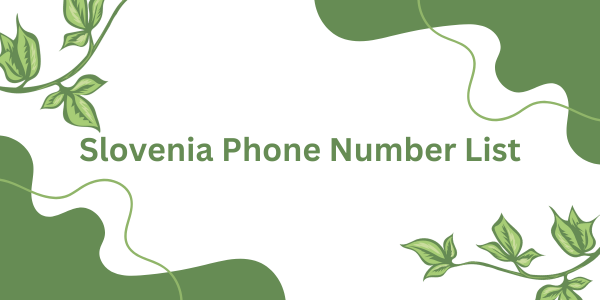|
|
Slovenia manages its natural resources through a combination of sustainable policies, environmental legislation, and conservation efforts. With its diverse geography, which includes forests, rivers, mountains, and agricultural land, Slovenia prioritizes the Slovenia Phone Number List responsible use of its natural assets to ensure long-term environmental and economic sustainability.
Forests
Forests are one of Slovenia's most vital natural resources, covering about 62% of the country’s land area. Slovenia has one of the highest rates of forest cover in Europe. Forests provide timber, recreational spaces, and protection against natural hazards, while supporting biodiversity. Slovenia employs sustainable forest management practices guided by EU forestry policies and the Forest Act. Logging is limited, regulated, and carefully monitored to ensure minimal ecological impact. Slovenia is also active in forest preservation and reforestation projects to maintain forest health and biodiversity.
Water Resources
Water is another vital natural resource in Slovenia. With its rivers, lakes, and groundwater systems, Slovenia has abundant freshwater sources. The country places significant emphasis on water resource management, ensuring clean drinking water, protecting aquatic ecosystems, and maintaining hydrological balance. Slovenia's major rivers, such as the Sava, Drava, and Soca, are monitored under national and European Union water management policies. Efforts like wastewater treatment plants and river conservation projects have been implemented to mitigate pollution and ensure the long-term availability of clean water.

Agricultural Land
Slovenia has a mix of arable and pastoral land, utilized for agricultural production, livestock farming, and sustainable food production. Slovenia manages its agricultural resources by promoting sustainable farming techniques and European Union agricultural subsidies. Programs support small-scale family farms and organic farming, focusing on biodiversity, soil protection, and ecological farming practices.
Mineral Resources
Slovenia has limited mineral resources but manages its mining sector with environmental awareness and modern technologies. The country operates sustainable mining, primarily extracting coal, limestone, and clay, while adhering to strict environmental protection laws to minimize ecological disruption.
Energy and Sustainability Initiatives
Slovenia has focused on renewable energy to reduce dependency on non-renewable resources. Hydropower, wind energy, and solar energy projects are promoted to support low-carbon alternatives. Slovenia has implemented policies that align with European Union sustainability goals and climate change mitigation strategies.
Conservation and Biodiversity
To ensure the preservation of its natural heritage, Slovenia has established a network of protected areas, including national parks and nature reserves, such as Triglav National Park. These areas are vital for biodiversity conservation, recreation, and sustainable tourism.
Conclusion
Slovenia’s approach to managing its natural resources revolves around sustainability, conservation, and EU integration. Through comprehensive environmental legislation, EU funding, and community-based initiatives, Slovenia ensures that its natural resources support the economy while protecting the environment for future generations.
|
|